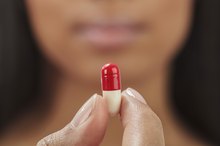Kidney Cysts & Diet
Polycystic kidney disease is an inherited disease in which numerous cysts or fluid-filled pouches form on the kidneys. During the early stages of the disease, the cysts cause your kidneys to swell which leads to impairment of kidney function, according to PubMedHealth 1. Polycystic kidney disease can cause total loss of kidney function. Your doctor may advise you to avoid certain foods to prevent complications.
Low-Sodium Diet
Your kidneys help remove excess fluid from the body. When kidney cysts disrupt this function, fluid builds up in the body, leading to high blood pressure and swelling. Sodium is an essential mineral that helps maintain fluid balance by retaining fluid. A low-sodium diet is necessary when kidney cysts cause symptoms of kidney failure 2. If you eat high-sodium foods when your kidneys are not working properly, your body retains more fluid, which worsens your high blood pressure. You should avoid high sodium foods such as canned foods, table salt, seafood and cured meat.
- Your kidneys help remove excess fluid from the body.
- If you eat high-sodium foods when your kidneys are not working properly, your body retains more fluid, which worsens your high blood pressure.
Low-Fat and High-Fiber Diet
Can You Strengthen Your Kidneys?
Learn More
Keeping your body healthy helps prevent complications of polycystic kidney disease. MayoClinic.com recommends that you eat a low-fat and high-fiber diet to help lower high blood pressure, which can damage your kidneys. Your diet should contain plenty of fruits, vegetables and whole grains. If you are overweight, you should lose weight because excess weight can cause high blood pressure.
- Keeping your body healthy helps prevent complications of polycystic kidney disease.
- MayoClinic.com recommends that you eat a low-fat and high-fiber diet to help lower high blood pressure, which can damage your kidneys.
Protein
If you develop symptoms of kidney failure due to polycystic kidney disease, your doctor may advise you to eat less protein 2. Too much protein can make your kidneys work too hard, according to Drugs.com. Eating less protein slows down progressive loss of kidney function and also prevents accumulation of toxic substances in the body. When your kidneys are impaired by enlarged cysts, they are unable to remove protein by-products from the body, which leads to accumulation of toxic substances. Examples of protein-rich foods include:
- meat
- fish
- eggs
- chicken
- turkey
- milk
- yogurt
- cheese
- cream.
- If you develop symptoms of kidney failure due to polycystic kidney disease, your doctor may advise you to eat less protein 2.
- When your kidneys are impaired by enlarged cysts, they are unable to remove protein by-products from the body, which leads to accumulation of toxic substances.
Symptoms of Polycystic Disease
Normal Levels of Urine Creatinine & Protein
Learn More
If you have polycystic kidney disease, you may experience symptoms such as:
- dull pain in your back or flank pain on your sides due to enlarged kidneys
- abdominal tenderness
- swollen abdomen
- excessive urination at night
- blood in your urine
- frequent kidney infections
- kidney stones
- drowsiness
- headache
- high blood pressure
- joint pain
- nail abnormalities
- painful menstrual periods
Related Articles
References
- Drugs.com: Kidney Failure Diet
- Cleveland Clinic. Kidney Failure. Last Reviewed January 10, 2018.
- Potpara TS, Jokic V, Dagres N, et al. Cardiac Arrhythmias in Patients with Chronic Kidney Disease: Implications of Renal Failure for Antiarrhythmic Drug Therapy. Curr Med Chem. 2016;23(19):2070-83. doi:10.1093/eurheartj/ehy060
- Centers for Disease Control. National Chronic Kidney Disease Fact Sheet. 2017. Published 2017.
- Kazancioğlu R. Risk factors for chronic kidney disease: an update. Kidney Int Suppl (2011). 2013;3(4):368-371. doi:10.1038/kisup.2013.79
- National Institute of Diabetes and Digestive and Kidney Diseases. Choosing a Treatment for Kidney Failure. Published January 2018.
- Kim, D., Kim, M, Kim, H. et al. Early Referral to a Nephrologist Improved Patient Survival: Prospective Cohort Study for End-Stage Renal Disease in Korea. PLoS One. 2013. 8(1):e55323.
- Smart, N., and T. Titus. Outcomes of Early versus Late Nephrology Referral in Chronic Kidney Disease: A Systematic Review. American Journal of Medicine. 2011. 124(11):1073-80.e2.
- Smart, N., Dieberg, G., Ladhani, M., and T. Titus. Early Referral to Specialist Nephrology Services for Preventing Progression to End-Stage Kidney Disease. Cochrane Database for Systematic Reviews. 2014. (6):CD007333.
Writer Bio
Destiny Simmons has worked as a professional health writer since 2005. She specializes in health and nutrition articles. Her work has appeared in various health Web sites. Destiny holds a Bachelors of Science in nursing from Boston University and a Master of Public Health Nutrition from Tufts University.









